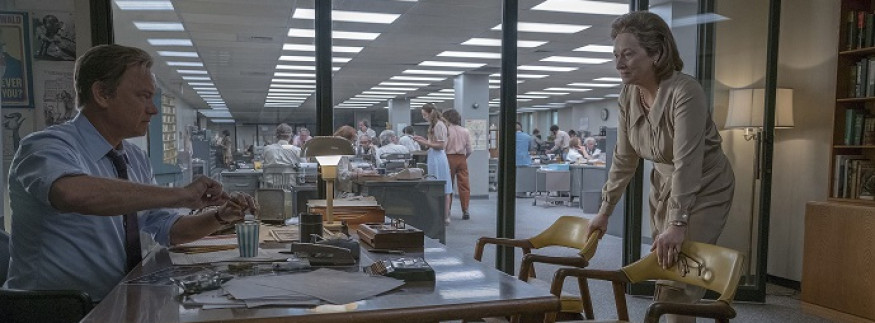
Remember the last time Steven Spielberg made an absolute classic? His last couple of films; “The BFG” and “Bridge of Spies”, while enjoyable, failed to leave a lasting impression. His latest film, however, is a return to form in every sense of the word, with Spielberg leaving behind excessive use of motion capture, and special effects. In other words, he returns to what he does best; making intense films surrounding provocative and important events.
In this film, in particular, Spielberg tackles the historical fight between the press and the US government; specifically, the Washington Post and the US Government’s battle over freedom of the press, with the latter attempting to prohibit any government secrets from emerging to the public via the former.
Spielberg has proven time and time again that he has a knack for storytelling and world building, and he gets to showcase his adeptness at creating a fully immersive period piece, this time set in the 1970’s. Spielberg almost shows off his impressive utilization of mise en scène, rather confidently. While the “70’s” look has always been depicted comically, Spielberg leaves no room for this. Indeed, elements like props, setting, and wardrobe blend in quite well with the film’s themes and tone.
What helps make the film an even more cohesive artwork has to be the captivating performances of Tom Hanks and Meryl Streep, with their never failing nor ending on-screen chemistry. Both actors depict real world non-fictional characters; Tom Hanks plays The Washington Post’s chief editor Ben Ben Bradlee, whilst Meryl Streep plays – America’s very first female publisher – Katherine Graham (also known as Kay Graham). The Post is driven by layers upon layers of ever relevant themes, mainly freedom of speech and gender equality.
Spielberg highlights Graham’s historical importance through multiple sequences and frames. One such frame, for example, is when Graham is asked to speak in front of the American Stock Exchange’s board members, i.e. a room saturated with old males. As she walks up the stairs, and towards this meeting room, we witness her walking through a large number of predominately female gendered secretaries. The juxtaposition of both frames allows the cinematic text to speak for itself, without any of the actors having to utter a single word.
The implication becomes clear from such frames: Graham – played by Streep – is responsible for initiating unprecedented acts for women within the film’s historical epoch, and for present day women. The relevancy of this theme is what gives Streep the chance to truly create a full character arc. Meryl Streep’s well-crafted performance inspires, as she becomes a beacon of hope for women who were/are stifled by patriarchy.
Tom Hanks is as dramatically flamboyant as ever; Hanks chews through the script with determination. We have to say, however, that performance wise he truly plays second fiddle to Meryl Streep. That being said, the frames that unite Streep and Hanks reveal the extent to which these two complement each other.
The Post’s real drawback has to be its pace. This criticism holds particular truth, when it comes to the film’s first half; certain narrative/plot elements have the tendency to drag on in a manner that correspondingly leaves audience members waiting for an outcome that could’ve been served up earlier.
All in all, Spielberg makes a welcomed return to the elements that he is well-known for, and crafts a memorable and captivating story. Even in its slowest moments, the film was driven by two powerhouse performances – ones that added to the film’s weight – courtesy of Meryl Streep and Tom Hanks. One can only hope that this legendary trio (Steven Spielberg, Meryl Streep and Tom Hanks) will continue to collaborate together on various projects, and will sustain their willingness to tackle relevant stories, historical narrative, and controversial topics.
Write your review
recommended
 Arts & Culture
Arts & Culture
Cairokee Touring Europe and North America in 2024
Cairokee Egyptian Artists +3 Sights & Travel
Sights & Travel



